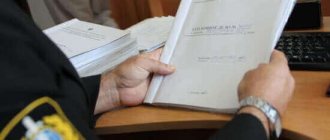The average citizen can list fifty TV series about tough cops, detectives and investigators. Perhaps he even watched Nolan Lebowitz’s thriller “The Illusion of Interrogation” and remembers Raskolnikov’s conversations with Porfiry Petrovich from the novel by F.M. Dostoevsky "Crime and Punishment". It seems that he knows everything about the interrogation procedure. But only until the moment when he is faced with testifying in practice.
It is not so important what the person being interrogated has to do: interrogation of an expert in a criminal trial or interrogation at the tax office - in any case, you will have to be nervous and worried. In this article we will tell you how to properly prepare for interrogation, how to behave during testimony, what points to pay attention to, and whether it is necessary to invite a paid lawyer to interrogation.
What is interrogation and how does it happen?
The interrogation is carried out by an authorized person in order to obtain and record facts important for a particular case. The procedure for conducting it is regulated by Chapter 26 of the Criminal Procedure Code of the Russian Federation (RF Code of Criminal Procedure).
Based on the time of conduct, primary, repeated and additional interrogations are distinguished. A person may testify as a victim, suspect, accused, witness or expert. Depending on the capacity in which the participant in the case is interrogated, interrogations are divided into types: interrogation of the victim, witness, etc.
The course of the interrogation and its stages
The witness and the victim are summoned by summons (Article 188 of the Code of Criminal Procedure of the Russian Federation). The summons states who is called, in what role, where, at what time and to what official. The summons also states the consequences of failure to appear without a valid reason. The summons is handed over to the summoned person against a signature or by means of communication.
Attention! If you receive an SMS message instructing you to appear at the department to give evidence, do not ignore it. According to Art. 188 of the Code of Criminal Procedure of the Russian Federation, a summons can be transmitted to the summoned person using means of communication (including SMS messages).
If you cannot arrive at the appointed time, you must notify the investigator in advance. If you fail to appear without a good reason, you may be forcibly taken to an authorized person (Article 113 of the Code of Criminal Procedure of the Russian Federation). There are other coercive measures for persons who ignore the summons: for example, monetary penalties (Article 111 of the Code of Criminal Procedure of the Russian Federation).
For accused, suspects, experts in Art. 188 of the Code of Criminal Procedure of the Russian Federation does not directly spell out the procedure for calling. According to Part 4 of Art. 172 of the Code of Criminal Procedure of the Russian Federation, the accused, who is at large, is summoned for questioning in the manner prescribed by Art. 188 Code of Criminal Procedure of the Russian Federation.
The Code of Criminal Procedure of the Russian Federation does not directly indicate that the summons of a suspect and an expert is carried out in the manner prescribed by Art. 188 Code of Criminal Procedure of the Russian Federation. But for suspects who are at large, as well as for experts, the law does not provide for a different procedure for calling.
Important! Pay attention to the role in which you are called to testify (this information should be indicated in the subpoena). Your rights will depend on your role.
For the investigator, the interrogation procedure is divided into three stages.
Preparatory stage
This stage affects the effectiveness of the interrogation and includes several actions. First of all, the investigator gets acquainted with the available materials on the case and finds out what circumstances may be known to the interrogated person.
After this, the investigator finds out what evidence indicates the guilt of the suspect (accused). The investigator also collects and analyzes information about the personality of the interrogated: analyzes biographical information, moral character and special knowledge, physical and mental disabilities, interest in the case, relationships with persons involved in the case.
During the preparatory stage, the time and place of the upcoming interrogation are determined, as well as the method of calling the interrogated person. When the testimony of several persons is important for the investigation, the order in which they are called is determined.
Important. If necessary, the investigator ensures that an interpreter or teacher is present during the interrogation (if the person being interrogated is under 16 years of age). Before the start of the investigative action, the investigator prepares recording forms and checks the serviceability of the technical means that he plans to use (for example, an audio recording device).
The investigator prepares an interrogation plan. Depending on the complexity of the investigative action, the plan can be oral or written, detailed and brief. The short plan consists only of a list of questions.
Interrogation
There are four stages of this procedural action:
- Introductory stage . The investigator checks the citizen's documents (passport). The last name, first name, patronymic and address of the interrogated person are entered into the protocol. The investigator explains to the interrogation participants their rights and responsibilities under Art. 307 and 308 of the Criminal Code of the Russian Federation.
- Free story from the person being interrogated. The person testifying freely tells everything he knows about the case. This stage is called free interrogation.
- The interrogated person's answers to questions. There are basic, additional, reminding and incriminating questions. Depending on the course of the conversation, the interrogator asks certain questions so that there are no gaps, inaccuracies, etc. in the testimony.
- The final stage. All participants in the investigative action are presented with a protocol for review. Those present are explained their right to make comments on the information included in the protocol.
The investigator should not ask the interrogated leading questions, as they distort the testimony.
Reference. Leading questions are questions in the wording of which there is a specific answer option or a choice of option from those proposed (Article 189, paragraph 2 of the Code of Criminal Procedure of the Russian Federation).
The final stage
At this stage, the investigator analyzes the information received and applies it to the circumstances of the case.
Rights of the authorized person
During interrogation, an authorized person has the right to:
- The use of technical means to detect traces of a crime and material evidence. Before the start of the interrogation, the investigator warns persons participating in the investigative action about the possibility of using technical means (clause 6 of Article 164 of the Code of Criminal Procedure of the Russian Federation).
- Involvement in the procedure of an employee of the body conducting operational-search activities (clause 7 of Article 164 of the Code of Criminal Procedure of the Russian Federation).
- Maintaining a protocol in accordance with Art. 166 Code of Criminal Procedure of the Russian Federation. (clause 8 of article 164 of the Code of Criminal Procedure of the Russian Federation).
- On your own initiative or at the request of the interrogated person, take photographs, make audio and (or) video recordings during the interrogation. The received materials are stored with other case materials. At the end of the preliminary investigation, the materials are sealed (clause 4 of Article 189 of the Code of Criminal Procedure of the Russian Federation).
Start. How it was
Not long ago, a young man approached me - a fourth-year student, a future economist.
The essence of the appeal is as follows. A criminal case was opened against him for illegal acquisition and possession of drugs under Part 2 of Art. 228 of the Criminal Code of the Russian Federation, because the size of the narcotic drug turned out to be especially large. This young man assured me that in this story he is a completely random person. Although, to be honest, I don’t give a damn. So, this guy, named Nikolai, told me his story about how he spent his day off. On Sunday, after calling ahead, he met with his friend Anatoly to go shopping. Walking from one store to another, through the central city park, Nikolai notices a brand new matchbox under his feet. Quickly bending down, Nikolai picked up a box of matches he had discovered from the park path. Having opened the box, he saw that instead of matches it contained an object in a factory-made foil package, well, very much, in his words, reminiscent of a condom. Without having time to evaluate the find, Nikolai noticed three young men rushing towards him. Postponing the study of the find until better times, Nikolai quickly put the box in his pocket, since he clearly had no time for it right now. Unfamiliar guys immediately laid our heroes, as they say, face down on the asphalt.
Soon Nikolai and Anatoly learned that the strangers who attacked them were operational employees of the internal affairs bodies. Next, our heroes were placed at a distance of half a meter from each other, facing the portal wall of the southern gate of the park.
Then one of the employees, in the presence of two retired witnesses walking in the park, asked my future client a question whether he had prohibited items, weapons, drugs, and the like on him. Nikolai replied that he had nothing prohibited on him. Having subjected Nikolai to a personal search, the operatives found in the side pocket of his jacket the very same matchbox stuffed with some kind of shiny bag, well, very reminiscent of a condom.
Further everything follows the proven scheme. Protocol of personal search, signed by the person being searched and attesting witnesses. Delivery to the police department. And a six-hour conversation between six operatives and my future ward.
During emotional communication with a detachment of operatives, Nikolai suddenly realized the gravity of what he had done. And, as a result, a wave of repentance for committing a criminal offense washed over him.
After which the investigator of the department for combating drug trafficking, a young, pretty lady, interrogated the repentant Nikolai, recording his confession in the protocol of interrogation of the suspect. And to give the appearance of comprehensiveness of the preliminary investigation, the investigator convinced Nikolai to conduct a search in his apartment without going to the apartment, that is, to draw up a report without leaving his office. In all likelihood, the investigator was taught this way by her senior comrades.
Nikolai clearly liked this idea. He willingly cooperated with the investigation. Still, no one will wander around the apartment and attract the watchful attention of neighbors.
Taking into account the awareness of his own guilt and other concessions to the investigation, Nikolai earned leniency from the investigator in the form of a written undertaking not to leave the place. In connection with this, in the morning he was released home in peace. So, Nikolai and I entered into an agreement to provide him with legal assistance. Now he was no longer just Nikolai, he became my client. Accordingly, I became his defender. Having listened to my client’s version, I only had to familiarize myself with the protocol of his interrogation, the protocol of his personal search and the protocol of the search in his home. Which is what was done when we first met the charming tracker. I would like to draw your attention to the fact that my client Nikolai’s friend, Anatoly, was not subjected to a personal search during their capture, was not taken to the police department, and did not figure in the case at all. Anatoly was not subjected to a personal search in a procedural sense; in fact, the playful hands of the detectives walked over the young man’s body, but for some reason they did not draw up a protocol about this for history. Apparently because nothing was found on him. So they decided that Anatoly did not exist in nature at all. Perhaps there were some other motives for Anatoly to remain without due attention from fighters against drug trafficking.
From the protocol of interrogation of the suspect, I learned that Nikolai, having called his friend mentioned above, went for a shopping trip. We decided to do some Sunday shopping, so to speak. And so that the trip would not seem boring, Nikolai decided to cheer up with spice.
For this purpose, he called from his mobile phone to a number that once and somewhere, on the wall of some house, was written in large letters: “Spice! Phone 555-77-99.” In one of the supermarkets, Nikolay deposited 500 rubles into this phone number through the Svyaznoy terminal and, calling it again to confirm the payment, received the following instructions.
A voice from the other end of the “wire” informed Nikolai that the goods would be in a matchbox on the pedestrian path of the central city park near the southern gate of the park, so many meters from such and such a lamppost. Nikolay was also informed of the time the box appeared on the path and the time it (the box) was waiting, that is, 15 minutes from the moment it was placed.
After which everything happened as described above, except that Nikolai knew about his acquisition of the drug. In addition, during his personal search, Nikolai, when asked by the officer whether he had any prohibited items on him, answered: “Yes, in the right pocket of my jacket I have a matchbox with a narcotic drug, Spice, inside.”
The pensioner witnesses in their interrogations probably gave similar testimony, I thought. But, unfortunately, the secrecy of the investigation, which is always shrouded in darkness, does not allow one to get acquainted with the protocols of interrogation of witnesses. The following was seen from the personal search protocol. Some detective there and there carried out a personal search of citizen Nikolai, who was asked to voluntarily hand over items prohibited in civilian circulation - weapons, drugs. After which, citizen Nikolai stated that he had the Spice smoking mixture for personal use. And then everything is as required by the form of this protocol. What was seized, how was it packaged. Signatures and addresses of witnesses.
It would seem like something even more. The guy is surrounded by the “I don’t want to” thing. But there is one point that was impossible not to notice. The entry in the protocol: “After which, citizen Nikolai stated that he has the Spice smoking mixture for personal use” was made in completely different color ink. No, of course, not red or green. The ink was also blue, but it was noticeably different from the color of the rest of the protocol text.
This circumstance gave me confidence. I kindly asked the investigator to make me a photocopy of this protocol. In response to my request, the investigator also kindly photocopied this protocol to me. “Now they won’t replace it,” I thought.
Next, I asked to see the protocol of the search of the home for my review. I was very interested in its contents, the names of the participants in the search, as well as the witnesses in front of whose eyes the astral search was carried out :-). Once again, the charming investigator and I exchanged mutual pleasantries. I asked her, she gave me a copy of the protocol. And what is very important, also a copy of the order to conduct a search in the suspect’s home. The protocol was drawn up in accordance with all the rules provided for by law. Not a single signature of its participant was missed. And the participants in this search were a fairly large company. These are two detectives, a forensic expert, two witnesses, who for some reason lived on the other side of our city, while the search was carried out at 21.30. Well, and, of course, this entire honest company was led by an investigator already known to us for her charm.
In the line “during the search it was discovered and seized” it is written: “no items prohibited in circulation were found.” Still would! There was no search in nature. But on paper it was.
Tactical techniques of the investigator during interrogation
Established psychological contact with the person being interrogated is the most important component of an informative interrogation for an investigator. In order to properly build a relationship with the person being interrogated and obtain the necessary data, he chooses conversation tactics and tactics.
Interrogation tactics are the model of behavior of the investigator, chosen by him after studying information about the person being interrogated at the preparatory stage. The tactics and techniques used are not prescribed by law. However, they must meet the following requirements:
- do not violate the rules of law and morality;
- do not put pressure on the person giving evidence;
- not be based on violence, threats, torture;
- do not rely on unrealistic promises;
- not to discredit the activities of law enforcement agencies.
During interrogation, various groups of tactical techniques are used. Techniques that motivate testimony include clarifying questions, retelling the event that happened, clarifying the details of the situation, using associative connections to recall the details of what happened, and clarifying the psycho-emotional state of the interrogated at the moment of perception.
If the interrogated person takes a negative position in relation to the investigation, the investigator tries to create in him the impression that opposition is pointless, neutralize aggressive behavior by creating a strict environment, takes advantage of the interrogated person’s uncertainty, unexpectedly presents eloquent evidence and monitors the reaction, calls for the fulfillment of civic duty, appeals to conscience, honor of the person being interrogated.
If the interrogated person has a benevolent attitude towards the investigation, a trusting environment is created during the interrogation; the investigator provides assistance to the person giving evidence in recalling the facts and asks clarifying questions.
In acute, conflict situations, an authorized person resorts to the following techniques: ensuring a business-like working environment, creating the impression that the investigator is fully aware of the circumstances of the case, convincing the person giving evidence that it is pointless to try to hide the facts known to him.
Confrontation and its differences from interrogation
Confrontation is the simultaneous interrogation of two persons who gave contradictory testimony. Contradictions in testimony arise as a result of honest misconception or deliberate misrepresentation of facts. The decision to conduct a confrontation is made by the investigator. The confrontation is carried out after the investigator has issued a resolution.
The main reason for its holding is the presence of contradictions in the essential circumstances of the case. Facts about the place and time of the commission of the crime, the guilt of the accused and the method of committing the crime are considered significant.
The tactics of interrogation and confrontation are different. Interrogation as an investigative action implies psychological interaction between the investigator and the person giving evidence, and excludes the presence of persons distracting the interrogated person from giving evidence.
The confrontation takes place after the initial interrogation. During the confrontation, the investigator asks the persons between whom it is being conducted whether they know each other and what kind of relationship they have. Those interrogated take turns giving evidence on the controversial circumstances of the case. After giving testimony, the investigator asks questions, if necessary. Persons between whom confrontations are being conducted may ask each other questions, with the permission of the investigator. (Article 192 of the Code of Criminal Procedure of the Russian Federation).
Types of preparation for an event
We have looked at the types of questions. There are also several ways to prepare for it - forensic, psychological and special. Let's look at them.
Forensic training:
- Studying data on a criminal case.
- Determining the circumstances that need to be clarified during interrogation.
- Studying the identity of the citizen who will be interrogated.
- Analysis of the relationship of the interrogated person with other participants in the process or proceedings.
- Preparation of a series of evidence.
- Determining the queue of interrogations, methods of calling the interrogated person to them.
- Determining the place and time of the event.
- Preparation of both the venue and the scientific and technical means that will be used.
- Creating the necessary environment for interrogation.
- Drawing up an event plan - questions that need to be asked.
- Determining the circle of people who will be interrogated. The first in line are citizens who are not interested in the outcome of the case.
- Choosing the method by which a citizen will be summoned to an event - a summons for questioning, a telephone call, etc.
Special training:
- Acquaintance with literature on the topic.
- Consultation with certain specialists.
Psychological preparation:
- Determining the tone of voice.
- Sequence of questions.
- The procedure for presenting evidence to the interrogated person.
Time and place
According to Art. 187 of the Code of Criminal Procedure of the Russian Federation, the interrogation is carried out at the place of preliminary investigation - this is the investigator’s office. The working environment is maintained in the office: the absence of objects that distract attention, as well as noise stimuli (telephone, radio, etc.).
The investigator has the right to conduct investigative actions at the location of the interrogated person. The interrogation may last continuously for no more than 4 hours. After this, a break of at least 1 hour is taken to rest and eat.
After a break, the investigative action may be continued, but the total duration of the interrogation during the day should not exceed 8 hours. If there are health problems, the duration of the interrogation is determined based on the doctor’s opinion.
Your rights and responsibilities during interrogation
The duty of the person being questioned during interrogation is to give truthful testimony. The witness and the victim are liable under Art. 307 of the Criminal Code of the Russian Federation (CC RF) for giving false testimony.
For an expert in Art. 307 of the Criminal Code of the Russian Federation also establishes penalties for deliberate deception. An expert is liable if he knowingly provides a false expert opinion. And the suspect and the accused do not bear criminal liability if they knowingly give false testimony.
Conducting interrogations at night is prohibited, except in urgent cases (Article 164, paragraph 3, Code of Criminal Procedure of the Russian Federation). In accordance with Art. 96 of the Labor Code of the Russian Federation, the time from 10 pm to 6 am is considered night time.
In paragraph 4 of Art. 164 of the Code of Criminal Procedure of the Russian Federation states the prohibition of the use of violence, threats and other measures that create a danger to the life and health of persons giving evidence.
Note! If during the interrogation the investigator behaves aggressively, strangely or provocatively, or tries to confuse and scare you in order to obtain the information necessary for the case, do not succumb to provocations and follow the chosen model of behavior throughout the entire investigative activity.
It is prohibited to confiscate electronic media from the person being interrogated without the appropriate document (clause 4.1 of Article 164 of the Code of Criminal Procedure of the Russian Federation).
The witness is obliged to answer all questions of the investigation. Refusal is possible only in cases where testimony is required against immediate relatives. In this case, the suspect or accused has the right not to testify. However, it is better to consult a lawyer in advance about this.
Regardless of the capacity in which you are called to testify, you have the right to request correction of information in the record if it distorts the meaning of your words. You have the right to write down your comments on separate sheets of paper, which will be attached to the protocol.
Legislative regulation
In our country, interrogation is regulated by the Code of Criminal Procedure of the Russian Federation. In particular, you need to refer to Chap. 26 of this act. The following articles will be specific:
- Art. 173-174. About the interrogation of the accused.
- Art. 189. Contains general rules for conducting interrogation by an authorized person.
- Art. 205. How does the interrogation of an expert proceed?
How to behave during interrogation by an investigator
Simple rules will help you think through your behavior in advance when communicating with an authorized person:
- Determine your position for the period of interrogation in advance and strictly follow it;
- remain calm, do not complain about the lack of time and the need to come to the department, speak to the point;
- speak politely and calmly, do not use profanity;
- do not provoke conflict - do not behave vulgarly, defiantly, inappropriately;
- carefully study the protocol and write down in the comments any violations found.
The protocol records the date of the interrogation, the time of its beginning and end, accurate to the minute, and the names of all persons present. Read the protocol carefully. If the investigator recorded your words with a distortion of meaning, ask him to make changes.
If the investigator refuses to correct the record, record this in your comments and indicate what you actually said. Sheets with comments are attached to the protocol. Information about their presence is entered in the “remarks” line in the protocol. The number of pages and content of comments are also indicated there. Indicate the phrases that begin and end your text with comments.
Important! All blank spaces in the protocol are crossed out at the end of the interrogation.
In what cases are they called in for additional questioning?
After the interrogated person has given evidence, the investigator analyzes the information received. To identify contradictions and inaccuracies in testimony, as well as to clarify details, a re-interrogation procedure is sometimes used.
During repeated interrogation, the investigator asks the interrogated questions about the circumstances of the case that were already raised during the previous investigative action. This type of interrogation is also used to convince the interrogated person to change the negative position he has taken in relation to the investigation.
Additional interrogation differs from repeated interrogation in its task - to fill in information. During this session, the person being interrogated is asked to testify about facts that were not raised during previous interrogations. If the investigation becomes aware of new circumstances of the case, of which one of the respondents may be aware, he will be summoned for additional questioning. Often this type of interrogation includes only a question-and-answer form of conversation.
Epilogue
About a month later, I learned from the head of the NON that the criminal prosecution against Nikolai had been discontinued.
But until now, by hook or by crook, he has refused to give me a copy of the decision to terminate the criminal prosecution. It seems to me that in fact the case was simply suspended for some far-fetched reasons in order to put the brakes on it. The preliminary investigation period ended two months ago. I wanted to send a written request for information about the progress of the investigation and the adoption of one or another procedural decision in the case, since the deadlines for its production provided by law have long expired. But I am afraid that the response may be the resumption of the preliminary investigation, or the cancellation of the decision to terminate the criminal prosecution, depending on their decision.
PS Friends and colleagues, I offer for your consideration my small book in electronic PDF format, which you can download to your computer by clicking on the link below.
Book here
If your rights were violated during interrogation
If your rights were violated during interrogation, this can be a serious advantage for you in future legal proceedings. Reflect violations in the actions of the investigator in your comments, which are attached to the protocol.
If the authorized person violated the interrogation procedure, the testimony obtained during this investigative action will be considered invalid. If you were threatened, make an appropriate note about this in the interrogation record. You also have the right to write a statement to the prosecutor's office or contact the appropriate department of the department that is dealing with the case.









